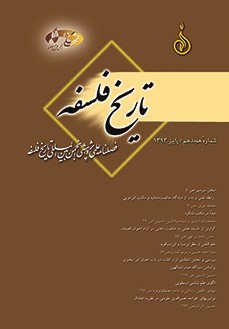مبدأ در مكتب شنكره
محورهای موضوعی : یافتههای نو درباره چهرهها و مدرسههای فلسفی ایران و جهان اسلامسيدضياءالدين حسيني 1 , محمدرضا اسدي 2
1 - دانشگاه علامه طباطبائي
2 - دانشگاه علامه طباطبائي
کلید واژه: شنکره ادويته ودانته خداوند,
چکیده مقاله :
نوشتار حاضر به بحث از تلقي شَنکَرَه در باب مبدأ ميپردازد که باعتقاد بسياري از متفکران هندو و بسياري از هندشناسان، بزرگترين حکيم سنت هندوست. باعتقاد شنکره برخي از متون اوپَه نيشَدي بر اين دلالت دارند که برَهمَن، نيرگونَه (نامتعين و نامتکيف) است و برخي ديگر بر اين دلالت دارند که او سَگونَه (متعين و متکيف) است. او در برخورد با اين مطلب، جانب نيرگونه بودن برهمن را ميگيرد و آن را مقصود و منظورِ نظرِ اصلي متونِ اوپهنيشدي ميداند. برهمن در سنت اَدوَيتَه سَت چيت آنَندَه، وجود و علم و لذت مطلق است، اما در عين اين رويکرد ايجابي ميتوان شاهد دغدغه هايي سلبي نيز بود که در آن همين عبارات نيز قادر نيستند [آنگونه که بايد] برهمن را معنا کنند و برهمن [به اين معنا] وراي ذهن و سخن است. همچنين در نظام شنکره از برهمن بعنوان آتمَن و خودِ اعلي ياد ميشود که هماهنگ با آموزة مايا، در واقع جز او نيز وجود و خودي نيست.
The present paper deals with Shankara’s view of the Origin. Many Indian thinkers and Indologists believe that Shankara is the greatest Indian philosopher. According to him, some of the Upanishads consider the Brahman as nirguna (unqualified), and some others consider it as saguna (qualified). Shankara himself maintains that Brahman is nirguna and considers it to be the main theme of the Upanishads. In the advaita sat-chit-ananda, Brahman is pure being, knowledge, and bliss. Nevertheless, in spite of this affirmative approach, we observe some negative arguments whereby the same attributes cannot be used to define the nature of Brahman deservedly. In this sense, Brahman is something beyond the mind and words. In Shankara’s system, Brahman is also referred to as Atman and the supreme self. It is also mentioned there that, in line with Maya’s teachings, there is in fact no existence and self except Brahman.
شايگان، داريوش، اديان و مکتبهاي فلسفي هند، تهران، انتشارات اميرکبير، ج2، چ7، 1389. #
Upanishads (The Principal Upanishads), Edited with Introduction, Text, Translation, and Notes by Sarvepalli Radhakrishnan, London, George Allen & Unwin Ltd, 1968. #
Upanishads (The Thirteen Principal Upanishads), Translation with Introduction and an Annotated Bibliography by Robert Ernest Hume, London, Oxford University Press, 1921. #
Chatterjee, Satishchandra, and Dheerendramohan Datta, An Introduction to Indian Philosophy, Calcutta, Calcutta University Press, 1948. #
Chinmayananā, H.H. Swami, Shankara the Missionary, Mumbai, Central Chinmaya Mission Trust, 1998. #
Dasgupta, Surendranath, A History of Indian Philosophy, 5 vols., Cambridge, Cambridge University Press, 1922. #
Deussen, Paul, Outline of the Vedanta System of Philosophy, Translated by J.H. Woods and C.B. Runkle, New York, Grafton Press, 1905. #
Deussen, Paul, The System of the Vedanta, Translated by Charles Johnston, Delhi, Motilal Banarsidass, 1972. #
Deutsch, Eliot, Advaita Vedanta: A Philosophical Reconstruction, Honolulu, University of Hawaii Press, 1988. #
Hiriyanna, M., Outlines of Indian Philosophy, Delhi, Motilal Banarsidass, 2005. #
Hiriyanna, M., The Essentials of Indian Philosophy, London, George Allen & Unwin Ltd, 1949. #
Isayeva, Natalia, Shankara and Indian Philosophy, New York, State University of New York Press, 1993. #
Klostermaier, Klaus K., A Concise Encyclopedia of Hinduism, Oxford, Oneworld Publications, 2003. #
Radhakrishnan, Sarvepalli (Chief Editor), History of Philosophy; Eastern and Western, 2Vols., London, George Allen & Unwin Ltd, 1957. #
Radhakrishnan, Sarvepalli, Indian Philosophy, 2Vols., London, George Allen & Unwin Ltd, 1948. #
Shankara, Commentary on Brahma, Sutra, 2Vols., Translated by George Thibaut, Oxford, Clarendon Press, 1890. #
Shankara, Commentary on Brahma Sutra, Translated by Swāmi Gambhirānanda, Calcutta, Advaita Ashrama, 1956. #
Shankara, Commentary on Brhadāranyaka Upanishad, Translated by Swāmi Mādhavānanda, Calcutta, Advaita Ashrama, 1950. #
Shankara, Commentary on Chāndogya Upanishad, Translated by Ganganatha Jha, Poona, Oriental Book Agency, 1942. #
Shankara, Commentary on Eight Upanishads, 2Vols., Translated by Swāmi Gambhirānanda, Calcutta, Advaita Ashrama, 1957. #
Shankara, Commentary on Isha, Kena, Mundaka, Katha, Prashna, Aitareya, and Taittiriya Upanishads, 3Vols., Translated by Sitarama Sāstri, Madras, The India Printing Works, 1923. #
Shankara, Commentary on Māndukya Upanishad and Gaudapāda’s Kārikā, Translated by Swāmi Nikhilānanda, Mysore, Sri Ramakrishna Ashrama, 1949. #


